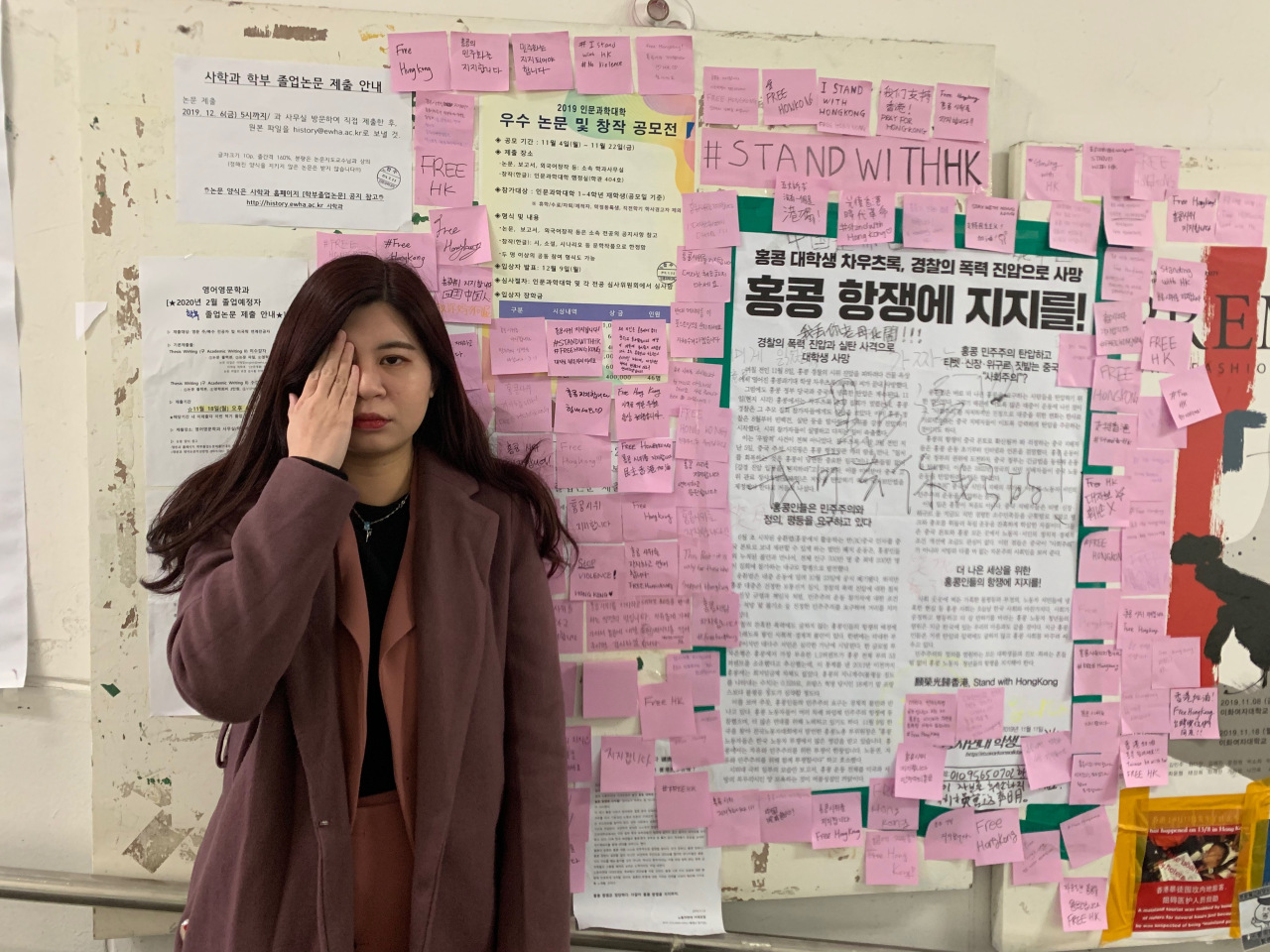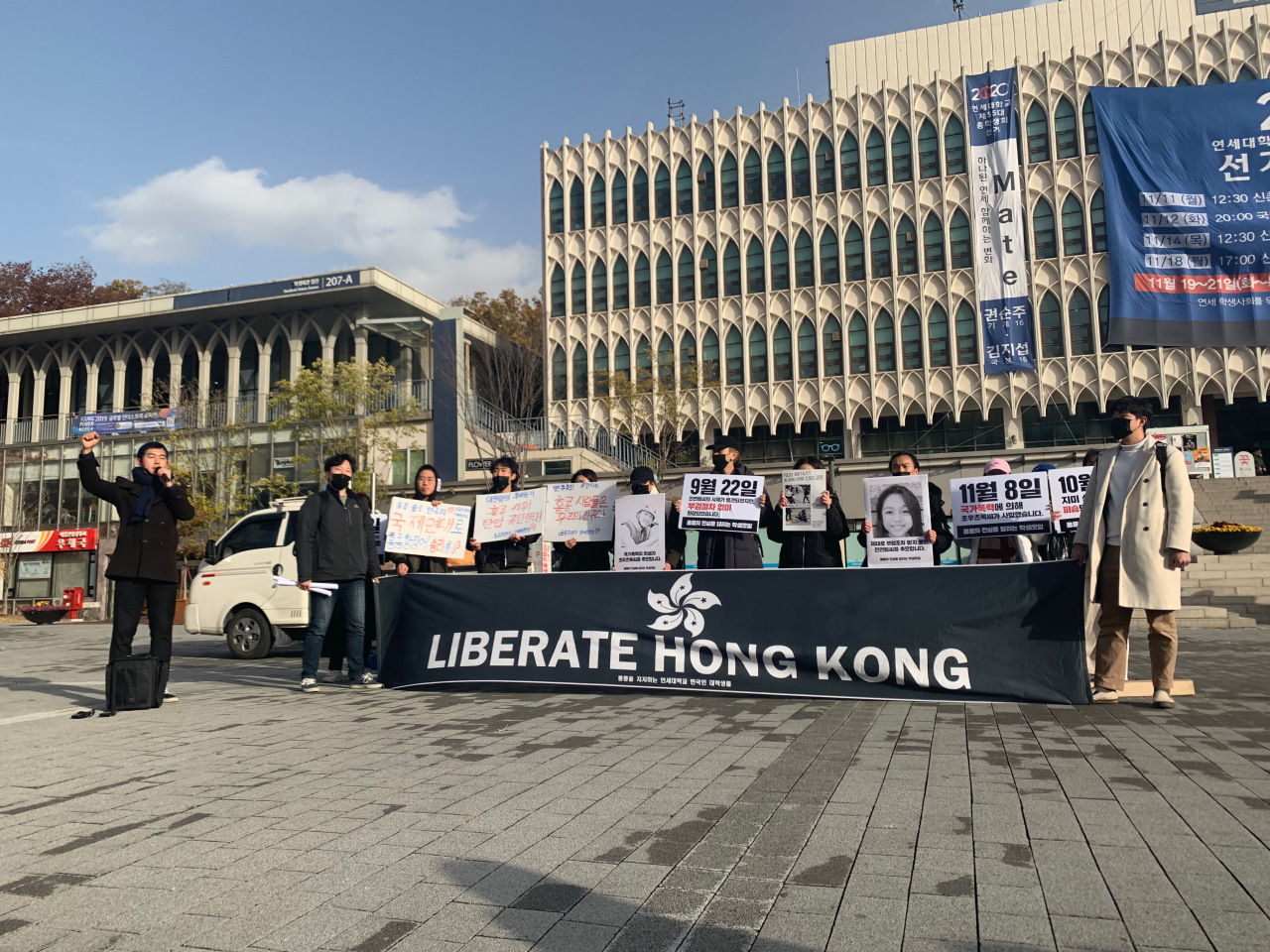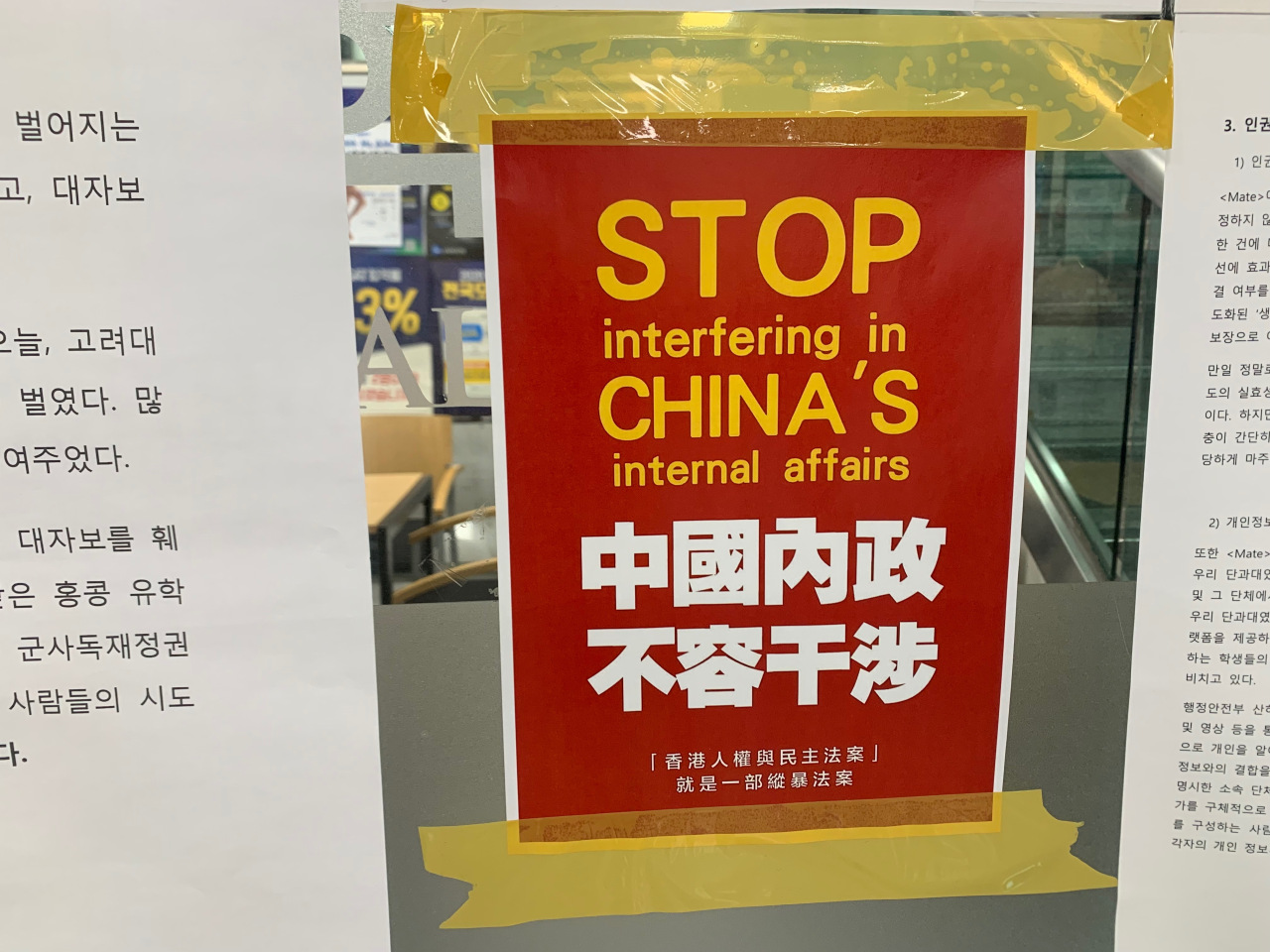[Newsmaker] At Korean universities, standoff between pro-HK protesters and Chinese students escalates
By Kim ArinPublished : Nov. 24, 2019 - 18:06
About 200 college students gathered Saturday afternoon at Seoul Plaza and marched some 2 kilometers toward the Chinese Embassy in Jung-gu, central Seoul, in a rally opposing police brutality against protesters in Hong Kong.
“We condemn state violence,” the students said. “Leaders in Korea and around the world are turning a blind eye to the horrors in Hong Kong in fear of the communist government of China.”
The rally was the first large-scale off-campus protest held by college students as campuses see a growing number of confrontations between South Korean students supporting the Hong Kong protests and students from China vandalizing pro-Hong Kong banners put up by students.
Korean college students say that their free speech rights are being infringed here as their acts of solidarity for the pro-democracy movement in Hong Kong are met with increasingly hostile reactions by students from mainland China.
“We condemn state violence,” the students said. “Leaders in Korea and around the world are turning a blind eye to the horrors in Hong Kong in fear of the communist government of China.”
The rally was the first large-scale off-campus protest held by college students as campuses see a growing number of confrontations between South Korean students supporting the Hong Kong protests and students from China vandalizing pro-Hong Kong banners put up by students.
Korean college students say that their free speech rights are being infringed here as their acts of solidarity for the pro-democracy movement in Hong Kong are met with increasingly hostile reactions by students from mainland China.

On Nov. 19 at Myongji University in Seodaemun-gu, Seoul, a Korean student and a Chinese student were booked by police for engaging in a tussle over a Hong Kong banner, marking the first instance of a standoff around the Hong Kong protests on a Korean campus leading to physical assault.
On-campus activism supporting Hong Kong’s democracy is leading to growing confrontations with international students from China over the past few months, according to Oh Je-ha, a student activist and fourth-year sociology student at Yonsei University, also in Seodaemun.
Oh, who has partaken in activities supporting the Hong Kong protests both at the school and outside it since September, said almost every pro-Hong Kong poster that he and his group have put up has been damaged.
“Sometimes a poster would last only a few hours before it is torn, scribbled on or plastered over with anti-Hong Kong notes and handouts,” he said.
“We are Korean students supporting Hong Kongers’ fight for democracy,” read a large poster taped on a wall outside the university’s library.
“We put up the banners in the hope of showing there are voices of support for Hong Kong citizens at our school, and to raise awareness about the issue within student society,” it said. “Vandalizing them inhibits our freedom of expression and is therefore undemocratic.”
Beside the poster were printouts in red and yellow that said, “Stop interfering in China’s internal affairs” and “I support the Hong Kong police.” Oh said these were posted within hours after the poster was hung.
“I don’t believe all mainland Chinese students oppose the protests in Hong Kong,” the 26-year-old said, adding it is “not right to find fault at an individual level.”
Oh said “as a citizen of a country that went through nationwide mass movements twice -- in the 1980s and then again a few years ago (against former President Park Geun-hye) -- both ending in the people’s victory,” he “naturally support(s) Hong Kongers and their fight.”


Last week, a Yonsei student lodged a report with district police after a set of placards reading “Liberate Hong Kong” and “Free Hong Kong, revolution of our times” was torn down by two Chinese-speaking individuals.
Seodaemun police said they might be able to file property damage charges against the individuals in question.
Yonsei University officials, meanwhile, refused to “meddle in student affairs.” Kim Seul-kyo, a public relations official at Yonsei, said the school was “leaving the situation up to the student community” and “trusting the recent conflicts between mainland Chinese students and students of other nationalities could be resolved among themselves.”
Students at Yonsei called the response “tepid,” and suggested it was influenced by the large number of Chinese students at the school.
“Yonsei should step up and protect its students’ freedom of speech, which is a protected right in Korea, and perhaps remind Chinese students that they are here as guests and that this is not Beijing,” said a law school student who asked not to be named.
“Also, I can’t help but think Yonsei is afraid of hampering its future chances of recruiting students from China by officially speaking out against vandalism,” he added.
According to Kim, nearly half of Yonsei’s undergraduate international student population hails from China.
In 2018, out of 50,997 international students at all universities, 35,799 came from China.
Last week at nearby Ewha Womans University, Korean students and Chinese students engaged in dayslong bickering over a wall of posters and sticky notes expressing support for Hong Kong, as the latter group tried to cover it up with competing messages.
“What we did was leave notes on bulletin boards around the campus, saying we wished for peace in our hometown,” said Tang Kar-wun, an international student from Hong Kong. “But none of them lasted longer than a day. We would find them torn to pieces and trashed with swear words in Chinese.”
Han Ga-eun, a student activist leading a pro-Hong Kong movement at Ewha, said, “There may not be an explicit rule, but damaging student-created posters and banners is unacceptable around here.”
Jung Yeun-hee, an official at Ewha’s office of international affairs, said the university was communicating with the relevant student groups and was in the process of devising measures to make sure “every member of the student body feels safe at Ewha.”
A 19-year-old language exchange student from Hong Kong at Sogang University said he was “surprised and so grateful” to find the pro-Hong Kong rallies in Seoul were mostly composed of Koreans, rather than Hong Kongers.
“Korean students’ activism inspired me to come out and participate,” he said after a rally at Yonsei University on Nov. 18.
An 18-year-old student from Hong Kong, who has been in Seoul for two years, said she has been participating in student rallies in the city.
“I have friends at different universities in Hong Kong who tell me the terrible things that are going on there, and although I may be far away, I wanted to do whatever little things I could to support them.”
“Police should stop violence against citizens. Hong Kong is not a big city and it’s being devastated,” she said.
As for acts of opposition from some Chinese students, she said, “I respect their opinions and their rights to express them, and I wish they would reciprocate the same respect for mine too.”
By Kim Arin (arin@heraldcorp.com)






![[From the Scene] Monks, Buddhists hail return of remains of Buddhas](http://res.heraldm.com/phpwas/restmb_idxmake.php?idx=644&simg=/content/image/2024/04/19/20240419050617_0.jpg&u=20240419175937)





![[Graphic News] French bulldog most popular breed in US, Maltese most popular in Korea](http://res.heraldm.com/phpwas/restmb_idxmake.php?idx=644&simg=/content/image/2024/04/18/20240418050864_0.gif&u=)



![[From the Scene] Monks, Buddhists hail return of remains of Buddhas](http://res.heraldm.com/phpwas/restmb_idxmake.php?idx=652&simg=/content/image/2024/04/19/20240419050617_0.jpg&u=20240419175937)

![[KH Explains] Hyundai's full hybrid edge to pay off amid slow transition to pure EVs](http://res.heraldm.com/phpwas/restmb_idxmake.php?idx=652&simg=/content/image/2024/04/18/20240418050645_0.jpg&u=20240419100350)

![[Today’s K-pop] Illit drops debut single remix](http://res.heraldm.com/phpwas/restmb_idxmake.php?idx=642&simg=/content/image/2024/04/19/20240419050612_0.jpg&u=)